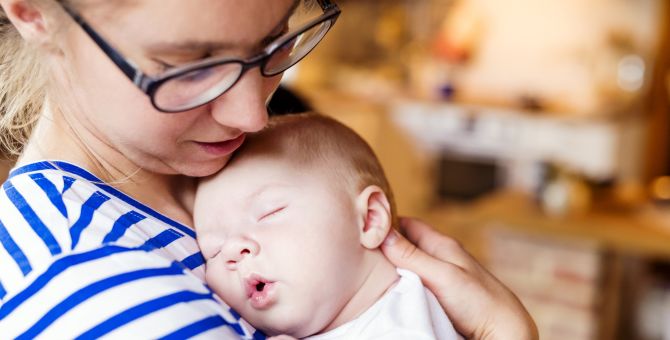Sleep regression & deprivation

Your health expert: Dr Robin Clarke, Medical Director, Bupa UK Insurance
Publish date 21/03/2024.
Next review 21/03/2025
Dr Robin Clark, Bupa UK Insurance’s Medical Director, shares what to expect when it comes to sleep regression, and how sleep deprivation can impact both carers and children.
What is sleep regression?

Sleep regression is when a child’s usually good sleeping pattern, or habits, change. Children may struggle to fall to sleep or sleep through the night. It can be difficult if your child’s sleeping pattern changes, but it’s often a natural part of their development. As your child’s brain develops, so does their sleep cycle.
Young babies spend more time in deep sleep. Once they reach about four months old, they may become less likely to sleep through the night. This is because they’re beginning to experience other phases of the sleep cycle, making their sleep naturally lighter.
Sleep regression is different for every child. But, each regression usually lasts between one and two weeks before returning to a more predictable pattern.
What do the search engines say?
The UK’s Google search habits reinforce that sleep regression can affect many ages, as well as their sleep-deprived carers.
In the last two years regression based queries have increased. †
CIO sleep training
Searches quadrupled
Ferber method
Searches doubled
Sleep training baby
Searches doubled
Infant sleep training methods
Searches doubled
Sleep regression ages

Sleep regression doesn’t happen at an exact age, it varies from child to child. It’s common for the first to happen at around four months old.
Developmental milestones in the first three years can also trigger sleep regression. This could include:
- growth spurts
- language learning
- teething
Signs of sleep regression include:
- less predictable and less consistent sleep
- being more irritable or emotional than usual
- difficulty napping
- becoming clingier or finding it difficult to be away from caregivers
How to deal with sleep regression
It might be tempting to think that your child’s sleep regression is happening because of something you’ve done. Don’t forget that occasional problems with your child’s sleep are completely normal.
Getting your child’s sleep back on track isn’t always easy, especially if you’re sleep deprived too. However, patience and consistency are key. These tips may help your child to get back on track:
Try to keep calm
It’s normal to feel frustrated at a sudden change in your child’s sleeping habits. But, a soothing environment will help you all adjust and recover better.
Stick to a routine
Try not to adjust your child’s routine too much. Instead, support their wind down as bedtime approaches. Avoid overstimulation by keeping lighting minimal. Prompts like baths, stories, or lullabies signal that it’s time to sleep..
Maintain your own routine
Try to keep your routine as consistent as you can, too. If you share caring responsibilities with a partner, take it in turns to have alternate nights ‘on’ and ‘off’. This way each of you is responsible for caring, so can both get the rest you need.
Practice sleep training
If you can, put your child to bed when they’re drowsy but still awake. This helps teach them to get themselves back to sleep if they wake up during the night.
Don’t forget snacks
Ensure that your child is eating enough throughout the day to help combat hunger during sleep. A small snack around 15 minutes before they go to bed can help stave off hunger.
Ask for help
Family and friends may give you extra support if you need it. Whether it’s helping out with care for a couple of hours or days, asking for assistance can make up your sleep debt.
When to see a health professional
Make sure you see a health professional if your child’s sleep regression lasts for longer than a couple of weeks.
If your child is struggling to sleep, be sure to keep an eye on their weight. If you notice that they’ve not grown much during this time, mention this when speaking to your clinician. Also make sure to report any:
- snoring
- breathing abnormalities
- feeding issues
- problems with peeing
Benefits of bedtime lullabies
Studies show that lullabies can help children get to sleep more quickly. This is especially true when they’re sung by parents or caregivers.
Lullabies trigger a relaxation response. Physiological activity lessens, heart rate slows and pupils dilate.
Three factors that make a great lullaby
What exactly makes the best lullabies? We’ve analysed some of Spotify's public playlists to find out.
A major key
A major key is songs made up of notes in the major scale.
The majority of the tracks we analysed were in major, rather than minor.
Tempo
The lullaby’s tempo should be beats per minute (BPM).
This was the most popular tempo in three quarters of the playlists we analysed.
Key of C
The lullaby should be in the key of C.
This was the most popular key in all of the playlists we analysed.
Modern lullabies
We’ve taken these principles to pull together a modern day lullaby playlist for parents in need of a helping hand:
Lean On Me
Bill Withers
Key: C major
Tempo: 75 BPM
What Was I Made For?
Billie Eilish
Key: C major
Tempo: 78 BPM
Heaven
(Classic Version)
Bryan Adams
Key: C major
Tempo: 71 BPM
Imagine
John Lennon
Key: C major
Tempo: 76 BPM
Truly
Lionel Ritchie
Key: C major
Tempo: 68 BPM
Lately
Stevie Wonder
Key: C major
Tempo: 76 BPM
I Wanna Be Yours
Arctic Monkeys
Key: C minor
Tempo: 68 BPM
All My Loving
The Beatles
Key: C sharp minor
Tempo: 78 BPM
Life Goes On
Ed Sheeran featuring Luke Combss
Key: C sharp minor
Tempo: 77 BPM
Sleep deprivation in parents and caregivers
Sleep deprivation symptoms can include difficulty thinking, speaking and remembering things. In mothers, sleep deprivation can increase the risk of developing postnatal depression.
Lack of sleep on its own can increase your stress levels. So, when you’re caring for a child going through sleep regression it’s important to take care of yourself. Charging yourself up on coffee isn’t always enough.
In the short term, sleep deprivation can leave parents more vulnerable to:
Poor mood
Poor decision making
Worse memory
In the long-term, sleep deprivation can also lead to other health problems like:
Depression
Obesity
High blood pressure
It’s never too early to try and address a lack of sleep, especially if you’re struggling with your mood. Speak to your health visitor or midwife for further help. If you have family health insurance, don’t forget that there’s specialised help to help you get back on track.

Sleep information from the experts
Find expert information about how age and health can affect your sleep. You can also browse our helpful articles on a range of sleep related conditions.
Support for families
Family Mental HealthLine
If you’re a Bupa customer and are concerned about your child’s mental health, give us a call.
Chat to one of our mental health nurses or advisers for support on:
0345 2667 938
Lines are open Monday to Friday, 8am to 6pm.
Family health insurance
If you’d like to get health insurance cover for your family, we can help.
We’re proud to offer discounts when you add additional family members to your cover, compared to the cost of separate policies.
† Google Keyword Planner averages, February 2023 to January 2025
Bupa health insurance is provided by Bupa Insurance Limited. Registered in England and Wales No. 3956433. Bupa Insurance Limited is authorised by the Prudential Regulation Authority and regulated by the Financial Conduct Authority and the Prudential Regulation Authority. Arranged and administered by Bupa Insurance Services Limited, which is authorised and regulated by the Financial Conduct Authority. Registered in England and Wales No. 3829851. Registered office: 1 Angel Court, London EC2R 7HJ
Bupa Health Trusts are administered by Bupa Insurance Services Limited. Registered in England and Wales No. 3829851. Registered office: 1 Angel Court, London EC2R 7HJ © Bupa 2025


